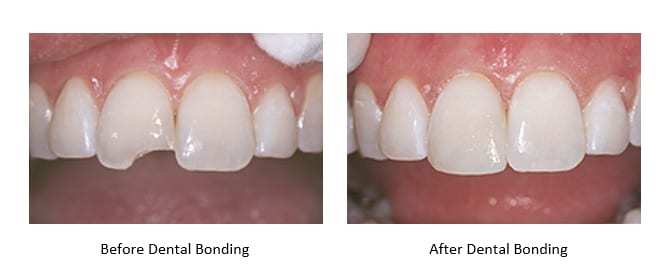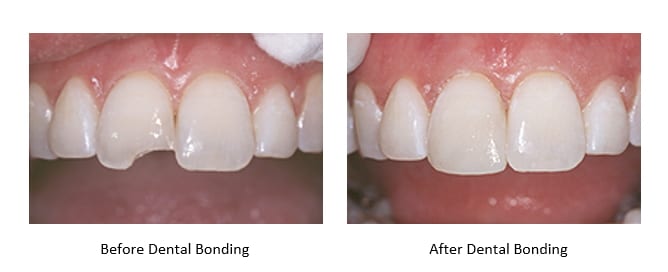
Dental bonding primarily addresses chipped, discolored, or misshapen teeth rather than whitening them. While it doesn’t directly whiten teeth, it can mask stains and discoloration, providing a brighter smile. For whitening, consider alternatives like teeth whitening treatments or veneers. Dental bonding lasts for years with proper care and is ideal for minor cosmetic enhancements. Consulting with a dentist helps determine the most suitable treatment.

Does Dental Bonding Whiten Teeth?
Dental bonding is a popular cosmetic dental procedure that can address a variety of dental issues, including discoloration or staining. However, it’s important to understand that dental bonding is primarily used to improve the appearance of teeth by fixing chips, cracks, or gaps, rather than whitening them. While dental bonding can make your teeth look brighter, it does not have the same whitening effects as professional teeth whitening treatments. In this article, we will explore the role of dental bonding in enhancing the appearance of teeth and discuss its effectiveness in whitening.
What is Teeth Bonding?
What is Teeth Bonding?
- Dental bonding involves applying a tooth-colored resin material to the surface of a tooth.
- The resin is hardened with a special light, bonding it to the tooth and improving its appearance.
- It is a versatile and cost-effective solution for fixing cosmetic issues like chips, cracks, gaps, and minor misalignment.
Benefits of Dental Bonding in Teeth Whitening
- Dental bonding can brighten the appearance of teeth by using color-matched resin to create a uniform and brighter smile.
- It helps mask stains and discoloration, enhancing overall tooth aesthetics.
The Limitations of Dental Bonding in Teeth Whitening
Effectiveness of Dental Bonding
- Dental bonding primarily focuses on structural issues and minor cosmetic imperfections rather than altering tooth color significantly.
- Professional teeth whitening treatments may provide more dramatic whitening results compared to dental bonding alone.
Considerations for Teeth Whitening
- Professional teeth whitening treatments use high-concentration bleaching agents to remove stains and discoloration effectively.
- Consult with your dentist to determine the best treatment option based on your specific dental needs and goals.
Managing Expectations
- While dental bonding can enhance tooth appearance and brightness, it may not achieve the same level of whitening as professional treatments.
- Discuss your goals and expectations with your dentist to ensure you choose the most appropriate treatment option.
The Benefits of Dental Bonding
Although dental bonding may not be primarily designed for teeth whitening, it offers several other benefits that make it a popular cosmetic dental procedure. Here are some of the advantages of dental bonding:
1. Improved Appearance: Dental bonding can enhance the aesthetics of your smile by addressing various cosmetic issues, such as chips, cracks, gaps, and discoloration.
2. Quick and Painless: The dental bonding procedure is typically quick and painless. In most cases, it can be completed in a single dental visit, without the need for anesthesia.
3. Cost-Effective: Compared to other cosmetic dental procedures, dental bonding is generally more affordable, making it an accessible option for many patients.
4. Versatility: Dental bonding can be used to address a wide range of cosmetic issues, providing a versatile solution for improving the overall appearance of your teeth.
5. Natural Look: The tooth-colored resin used in dental bonding can be customized to match the shade of your natural teeth, resulting in a seamless and natural-looking smile.
While dental bonding may not provide the same level of whitening as professional teeth whitening treatments, its ability to address various cosmetic issues and improve the overall appearance of your teeth makes it a valuable option for many individuals seeking to enhance their smiles.
Dental Bonding vs. Teeth Whitening
It’s important to differentiate between dental bonding and teeth whitening, as they serve different purposes when it comes to improving the aesthetics of your smile. Dental bonding focuses on addressing structural issues and minor cosmetic imperfections, such as chips, cracks, or gaps, while teeth whitening treatments specifically target tooth discoloration and staining.
Teeth whitening treatments, such as professional bleaching or whitening kits, use bleaching agents to remove stains and lighten the color of the teeth. These treatments are specifically designed to achieve a whiter and brighter smile. However, they may not be effective in fixing structural issues or filling gaps between teeth.
Dental bonding, on the other hand, can address a wider range of cosmetic concerns beyond tooth discoloration. It can be used to fix chips, cracks, gaps, and even minor tooth misalignment. Dental bonding provides a more comprehensive solution for improving the overall appearance of your teeth, while teeth whitening treatments are specifically focused on achieving a whiter smile.
In summary, dental bonding is primarily used to address structural issues and minor cosmetic imperfections, rather than solely focusing on teeth whitening. While dental bonding can make your teeth look brighter, it may not provide the same level of whitening as professional teeth whitening treatments. It’s important to consult with your dentist to determine the most suitable treatment option based on your specific dental needs and goals.
Key Takeaways: Does Dental Bonding Whiten Teeth?
- Dental bonding is a cosmetic procedure that can improve the appearance of teeth.
- While dental bonding can change the color of teeth, it does not whiten them.
- Dental bonding uses a tooth-colored resin that is applied to the teeth and shaped to desired results.
- This procedure can be a great option for fixing chipped, cracked, or misshapen teeth.
- If you’re looking for a teeth whitening solution, dental bonding may not be the best choice.
Frequently Asked Questions
Can dental bonding whiten teeth?
While dental bonding is a versatile cosmetic dental procedure, it is not specifically designed to whiten teeth. Dental bonding is primarily used to repair chipped, cracked, or discolored teeth, as well as to close gaps between teeth and reshape teeth for a more aesthetically pleasing appearance. However, bonding materials do not have the same whitening properties as traditional teeth whitening treatments.
If you are looking to whiten your teeth, it is recommended to consider professional teeth whitening treatments or over-the-counter whitening products. These options can effectively remove stains and discoloration from the surface of your teeth, resulting in a brighter and whiter smile.
How does dental bonding work?
Dental bonding is a relatively simple and minimally invasive procedure that can be completed in a single dental visit. The process involves the application of a tooth-colored composite resin material to the affected tooth or teeth. The resin is carefully shaped and molded to achieve the desired results, such as repairing chips or closing gaps.
Once the resin is in place, a special light is used to harden and bond the material to the tooth. After the bonding process is complete, the dentist will further shape and polish the bonded tooth to ensure a seamless and natural-looking result.
Is dental bonding a permanent solution?
While dental bonding is a long-lasting solution, it is not considered to be permanent. The lifespan of dental bonding can vary depending on factors such as oral hygiene habits, dietary choices, and the extent of the bonding treatment.
On average, dental bonding can last anywhere from 5 to 10 years. However, it is important to note that the bonding material can become stained or chipped over time, requiring touch-up or replacement. Regular dental visits and good oral hygiene practices can help prolong the lifespan of dental bonding.
Are there any risks or side effects associated with dental bonding?
Dental bonding is a safe and commonly performed procedure with minimal risks and side effects. However, it is possible to experience some sensitivity or discomfort immediately after the bonding treatment, especially if the bonding material comes in contact with the tooth’s nerve.
In rare cases, allergic reactions to the bonding material can occur, but this is extremely uncommon. It is important to discuss any concerns or allergies with your dentist before undergoing the bonding procedure to ensure your safety and comfort.
Can dental bonding be used to fix stained teeth?
Yes, dental bonding can be an effective solution for stained teeth. The tooth-colored composite resin used in bonding procedures can help cover up and mask stains, resulting in a brighter and more uniform smile.
However, it is important to note that dental bonding may not be as long-lasting or stain-resistant as other cosmetic dental treatments, such as porcelain veneers. If you have severe or deeply embedded stains, your dentist may recommend alternative treatments to achieve the desired results.
How to whiten composite bonding? | Holly Dental Practice
Final Summary: Does Dental Bonding Whiten Teeth?
Dental bonding is a versatile cosmetic procedure that improves teeth appearance by fixing imperfections like chips and gaps. While it can make teeth look whiter by covering stains, it doesn’t whiten them like professional treatments. It’s an affordable option for a brighter smile, but it has limitations compared to professional whitening. Consulting a dental professional is key to achieving desired results and confidence in your smile.
Call or Book appointment online
:Ace Dental Care Alpharetta office: 678-562-1555 - Book Now
Ace Dental Care Norcross office: 770-806-1255 - Book Now
Disclaimer
This blog post was generated by artificial intelligence. The content of this post may not be accurate or complete, and should not be relied upon as a substitute for professional advice. If you have any questions about the content of this post, please contact us.
We are constantly working to improve the accuracy and quality of our AI-generated content. However, there may still be errors or inaccuracies. We apologize for any inconvenience this may cause.





